December 2009 North American blizzard
The December 2009 North American blizzard was a powerful nor'easter that formed over the Gulf of Mexico in December 2009, and became a major snowstorm that affected the East Coast of the United States and Canadian Atlantic provinces. The snowstorm brought record-breaking December snowfall totals to Washington, D.C., Baltimore, and Philadelphia.
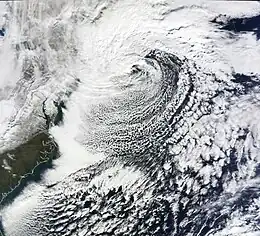 Satellite image of the nor'easter on December 20 near the Mid-Atlantic states. | |
| Type | Extratropical cyclone Blizzard Winter storm |
|---|---|
| Formed | December 16, 2009[1] |
| Dissipated | December 20, 2009 |
| Lowest pressure | 968 millibars (28.6 inHg)[2] |
| Tornadoes confirmed | 4 |
| Max. rating1 | EF0 tornado |
| Maximum snowfall or ice accretion | 26.3 inches (67 cm)[3] |
| Fatalities | 7 fatalities[4] |
| Areas affected | East Coast of the United States (from North Carolina to Maine) Canadian Atlantic provinces (portions of Nova Scotia, Newfoundland, Labrador)[5] |
Part of the 2009–10 North American winter 1Most severe tornado damage; see Fujita scale | |
The blizzard disrupted several regions, and in some areas the snowfall rate prevented snow plows from maintaining the roads. The blizzard caused flights and trains to be canceled, and left areas without power. Kentucky, Maryland, Virginia, West Virginia, and New Castle and Kent counties in Delaware declared a state of emergency. Seven deaths were reported to have been caused by the storm.
Meteorological history
On December 16, 2009, meteorologists identified a storm forming in the Gulf of Mexico.[6] It produced record rainfall in regions of Texas and had the potential to strengthen as it moved through Georgia and Florida and further north. Weather models accurately predicted that this storm would meet with cold air while retaining its heavy precipitation.[1] By the afternoon of December 19, the large, low pressure region had moved off the East Coast, intensifying and bringing heavy snow to the major Mid-Atlantic cities.[7][8] Blizzard warnings were issued in Washington, D.C., Baltimore, and Long Island.[1] As the storm moved northward along the East coast, at one point it measured 500 miles (800 km) across 14 states.[9] The storm produced whiteout conditions and dumped about 16–20 inches (41–51 cm) of snow in major cities along the Eastern seaboard.[10]
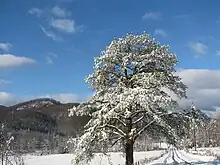
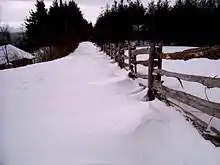
Snowfall
The storm produced record 24-hour snowfall in Washington, D.C., and Roanoke, Virginia, where nearly 2 feet (61 cm) of snow accumulated. Interior areas of West Virginia saw 30 inches (76 cm) of snow.[3] The storm broke the record for the amount of snow in a single December event at Ronald Reagan Washington National Airport, where 16.4 inches (42 cm) of snow accumulated.[8][11] The National Weather Service in Brookhaven, New York reported 26.3 inches (67 cm) of snow, the town's largest snowfall since 1949.[12][13]
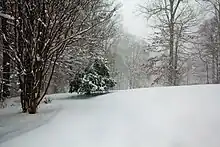
In Philadelphia, snowfall reached more than 2 inches (5.1 cm) per hour, resulting in significant disruption of Interstate 95.[1] By Sunday, December 20, 23.2 inches (59 cm) of snowfall had accumulated in Philadelphia, surpassing the city's second-largest record 21 inches (53 cm) snowfall of February 11–12, 1983 – which itself was surpassed less than two months later by the February 5–6, 2010 North American blizzard. The storm also broke a 100-year-old record for the largest single December storm, previously 20.2 inches (51 cm) on December 25–26, 1909.[14] The storm was reported by meteorologists to share attributes of the 1983 storm.[15]
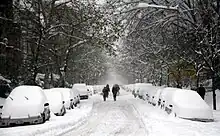
In more mountainous areas, snowfall was even heavier. By midnight Saturday morning, snowfall in Boone, North Carolina had reached 14–18 inches (36–46 cm), Asheville, North Carolina accumulated up to 12 inches (30 cm), while Greensboro, North Carolina received 3–7 inches (7.6–17.8 cm). Portions of eastern Kentucky received as much as 16 inches (41 cm).[16] In the Roanoke Valley, over 11 inches (28 cm) had fallen by midnight. By Sunday morning, Norwich, Connecticut received 20 inches (51 cm) of snow, while over 11 inches (28 cm) of snow fell in Boston, Massachusetts.[17]
Winter storm warnings for New York and a blizzard warning for Long Island expired at 11 a.m. Sunday, warnings for the Boston and Providence metro areas and much of southeastern New England expired at noon. A blizzard warning for Cape Cod expired at 1 p.m.[18] The storm reached southwestern portions of Nova Scotia, delivering up to 25 centimetres (9.8 in) of snow in Digby, Yarmouth, Shelburne and Queens counties. Portions of Newfoundland and Labrador received freezing rain as well.[5][19]
Snowfall totals by state
|
Impact
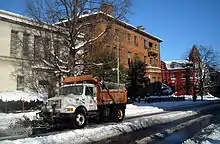
Some regions affected by the storm experienced winds up to 25–30 miles per hour (40–48 km/h) with gusts of 45–50 miles per hour (72–80 km/h).[3] Ronald Reagan Washington National Airport, Washington Dulles International Airport, and Baltimore/Washington International Thurgood Marshall Airport saw whiteout conditions, causing flights to be delayed or canceled. Of 740 scheduled departures at Washington National and 530 at Dulles, only 14 and 12, respectively, were able to take off.[20] President Barack Obama, arriving at Andrews Air Force Base after the UN Climate Conference, was forced to return to the White House by motorcade instead of helicopter.[21] More than 800 flights were canceled at New York City's three major airports.[22] Delays averaged over six hours at Philadelphia International Airport.[23]
Many Amtrak trains were also canceled or delayed and service on Washington, D.C.'s Metrorail was suspended to all outdoor stations at 1 pm on December 19 and remained suspended until late in the day December 20; underground service remained operational.[20] One Amtrak train, carrying 255 passengers, halted for six hours while a frozen track switch was fixed.[11]
On roads, snow plows were unable to keep up with fast snow accumulations. Road accidents and stuck vehicles further hindered snow removal. On some major highways, traffic slowed to five miles per hour.[24] In West Virginia, on I-77 between Ghent and Beckley, thousands of motorists were stranded for up to 18 hours due to impassable roads. The interstate was closed for 15 hours. Governor Joe Manchin has launched a full investigation into why the roads were in such poor condition. Greyhound Lines canceled 294 routes through Maryland, Virginia, Washington, D.C., and West Virginia on December 19 and suspended service in and out of New York late Saturday.[25]


Thousands of power outages were reported in Virginia, Kentucky, and North Carolina, reportedly caused by snow weighing down on power lines. By midnight Saturday morning, when the storm had just begun to strike the area, reported power outages had already exceeded 40,000.[1] In Kentucky, 107,000 power outages were reported.[16] A snow emergency was declared in Washington, D.C., where Mayor Adrian Fenty asked residents to avoid venturing onto the roads.[26] States of emergency were declared in Kentucky, Maryland, Virginia, West Virginia and New Castle and Kent counties in Delaware.[25]
The storm was held responsible for seven deaths in North Carolina, Ohio, Pennsylvania, Virginia, and West Virginia, including one death resulting from a head-on collision between a snowmobile driver and a horse-drawn carriage.[4]
The nor'easter, which arrived on the last weekend before Christmas, hurt sales at retail stores in affected regions, but boosted online sales. Super Saturday, the last Saturday before Christmas, typically nets $15 billion in retail sales.[27] It is estimated that 30% of this revenue comes from the northeastern United States.[26] Stores that managed to open saw reduced traffic.[28] The storm resulted in an estimated loss of $2 billion in retail sales.[29]
Due to widespread accumulation of heavy snow, the storm was ranked as a high-end Category 2 ("significant") winter storm, on the Northeast Snowfall Impact Scale. The ranking is based on the amount of snowfall, the area, and the population affected.[30]
See also
- List of Regional Snowfall Index Category 4 winter storms
- List of NESIS storms
- 2009 North American Christmas blizzard
- February 5–6, 2010 North American blizzard
- February 9–10, 2010 North American blizzard
- February 25–27, 2010 North American blizzard
- December 2010 North American blizzard
- January 2016 United States blizzard
- Winter of 2009–2010 in Europe
- Winter storms of 2009–2010
- Winter storms of 2009–2010 in East Asia
References
- Tim Ballisty. "Snow Totals Adding Up from Blizzard 2009". The Weather Channel. Archived from the original on December 21, 2009. Retrieved December 19, 2009.
- "HPC Storm Summary #9". Hydrometeorological Prediction Center. Retrieved December 20, 2009.
- James Wilson. "Crippling snow from Mid-Atlantic to Northeast". The Weather Channel. Archived from the original on December 15, 2009. Retrieved December 19, 2009.
- McFadden, Robert D.; Berger, Joseph (December 21, 2009). "Commuters Still Feel Effects of Snow". The New York Times. Retrieved December 21, 2009.
- "Crippling U.S. storm moving north". CBC News. cbc.ca. December 20, 2009. Retrieved December 20, 2009.
- Wood, Anthony R.; Colimore, Edward. "Better watch out: Snow looks to reign". The Philadelphia Inquirer. Archived from the original on December 22, 2009. Retrieved December 19, 2009.
- Alex Sosnowski. "Super Saturday Blizzard to Reach Southern New England Next". Accuweather. Retrieved December 19, 2009.
- Zapotosky, Matt; Morello, Carol; Halsey III, Ashely (December 20, 2009). "The great dig-out: Neighborhood streets still clogged with snow". The Washington Post. washingtonpost.com. Retrieved December 20, 2009.
- Griffith, Stephanie (December 21, 2009). "Record-breaking storm closes US federal government". Agence France-Presse. news.yahoo.com. Archived from the original on December 22, 2009. Retrieved December 23, 2009.
- "Five dead as snowstorm engulfs US East Coast". "BBC". December 20, 2009. Retrieved December 19, 2009.
- "Snow socks Eastern states, halts travel". Los Angeles Times. Associated Press. Archived from the original on December 21, 2009. Retrieved December 20, 2009.
- McFadden, Robert D. (December 21, 2009). "Records Fall as Snow Blankets East Coast". The New York Times. pp. A1. Retrieved December 22, 2009.
- "Storm Crawls Into New England, Leaving Mess Behind". nytimes.com. Associated Press. December 20, 2009. Retrieved December 22, 2009.
- Wood, Anthony (December 21, 2009). "A winter's worth of snow, before winter". The Philadelphia Inquirer. Archived from the original on December 25, 2009. Retrieved February 5, 2010.
- Wood, Anthony; Colimore, Edward (December 19, 2009). "Better watch out: Snow looks to reign". The Philadelphia Inquirer. Archived from the original on December 22, 2009. Retrieved February 5, 2010.
- Hopkins, Shawntaye (December 19, 2009). "Gov. declares state of emergency, more than 100,000 homes without power". Lexington Herald-Leader. Retrieved December 20, 2009.
- Meghan Evans (December 20, 2009). "Latest Snowfall Map for Blizzard". AccuWeather.com. Retrieved December 20, 2009.
- "Storm heads north after socking East Coast". CNN. December 20, 2009. Retrieved December 20, 2009.
- Meghan Evans (December 20, 2009). "Nor'easter Still Pounding Eastern New England". AccuWeather.com. Retrieved December 20, 2009.
- Asha Beh. "Above Ground, Metro Shuts Down". NBC Washington. Retrieved December 19, 2009.
- "Snow socks Eastern states, halts travel". Los Angeles Times. Associated Press. December 20, 2009. Archived from the original on December 21, 2009. Retrieved December 20, 2009.
- Joseph Berger (December 21, 2009). "Storm Finally Exits a Snow-Covered East Coast". The New York Times. Retrieved December 20, 2009.
- "Philadelphia Airport delays averaging 6 hours due to snowstorm". NJ.com. December 19, 2009. Retrieved August 23, 2023.
- "VDOT Continues to Address Winter Storm". NBC 29, WVIR-TV. Archived from the original on February 24, 2012. Retrieved December 20, 2009.
- Liz Robbins (December 20, 2009). "Winter Arrives, Blanketing East Coast in Snow". The New York Times. Retrieved December 20, 2009.
- Baertlein, Lisa; Klayman, Ben. "Storm threatens U.S. retailers' last holiday push". Forbes. Retrieved December 20, 2009.
- Dodes, Rachel; Zimmerman, Ann (December 20, 2009). "Snowstorm Threatens 'Super Saturday' Sales". The Wall Street Journal.
- Hank Daniszewski. "Tis the Season of Bargains". London Free Press. Archived from the original on December 23, 2009. Retrieved December 20, 2009.
- Ylan Q. Mui (December 22, 2009). "Washington area retailers try to recoup sales lost in snowstorm". The Washington Post. Retrieved December 22, 2009.
- "The Northeast Snowfall Impact Scale (NESIS)". Ncdc.noaa.gov. Archived from the original on January 5, 2011. Retrieved January 15, 2010.
- "Florida Event Report: EF0 Tornado". National Climatic Data Center. National Weather Service Office in Miami, Florida. 2010. Retrieved December 30, 2010."Florida Event Report: EF0 Tornado". National Climatic Data Center. National Weather Service Office in Key West, Florida. 2010. Retrieved December 30, 2010."Florida Event Report: EF0 Tornado". National Climatic Data Center. National Weather Service Office in Tampa, Florida. 2010. Retrieved December 30, 2010."Florida Event Report: EF0 Tornado". National Climatic Data Center. National Weather Service Office in Key West, Florida. 2010. Retrieved December 30, 2010.
External links
- "Washington's winter wallop", photo gallery by The Washington Post
- "Storm Goes Northeast With Its Snowy Blanket", photo gallery by The New York Times